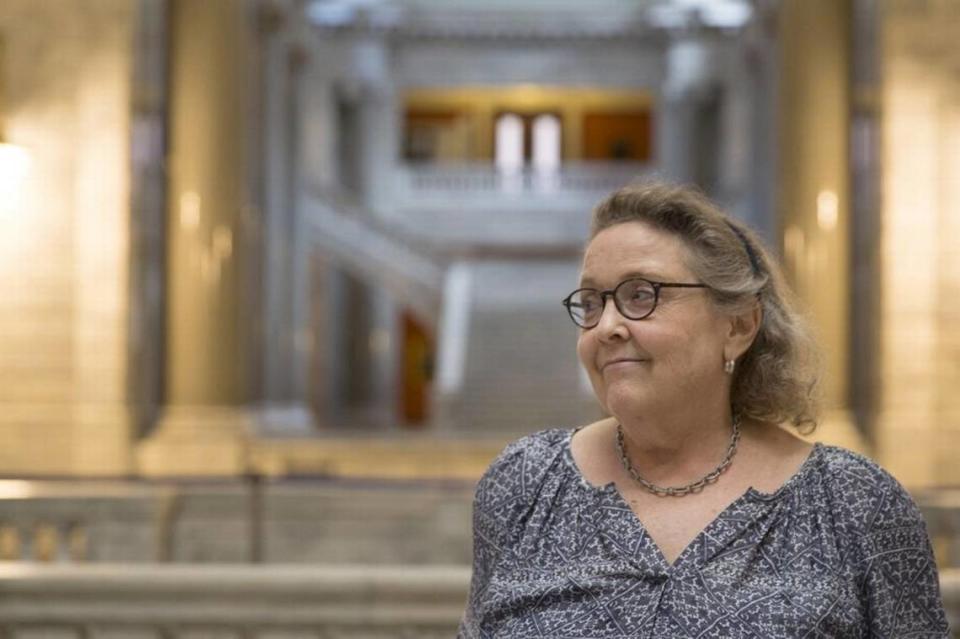Daniel Cameron finally called out by judge over disdain for open government | Opinion
- Oops!Something went wrong.Please try again later.
At last, Attorney General Daniel Cameron has been called out by a court for ignoring precedent when it conflicts with his policy preferences for secrecy in government.
The Oldham County Circuit Court’s June 13 open meetings opinion in J. Albert Harrison v. Oldham County Ethics Commission should serve as a cautionary tale for Kentucky’s next attorney general.
Harrison, along with his attorneys, Jeremy Rogers and Suzanne Marino of Louisville’s Dinsmore & Shohl, convinced the court to reverse an open meetings decision issued by Cameron’s office in September 2022 that would have effectively “eviscerate[d] most of the Open Meetings Act’s operative provisions.”
Oldham Circuit Court Judge Jerry Crosby II ruled that the local ethics commission’s failure to observe the requirements for conducting a closed session — specifically the requirements that it give notice to the public of the statutory basis for a closed session and that it take final action in open session — violated the open meetings law.
In 2022, Cameron’s has determined that although the ethics commission failed to comply with the open meetings requirements for closed session, the commission’s noncompliance did not violate the open meetings law. His decision ignored over four decades of case law and attorney general decisions.
The Cameron decision would have permitted members of a public agency to convene a public meeting, retire to closed session, exit the open meeting without legal explanation — leaving the public to wonder what the members were discussing behind closed doors — and return some time later for the purpose of adjournment, having taken final action in closed session.
The Oldham Circuit Court rejected this affront to 40-plus years of precedent, agreeing with Harrison that Cameron’s “overly simplistic interpretation of [the statute] would effectively gut the Open Meetings Act.”
A repeat offender
The Franklin Circuit Court last year rejected an equally serious affront to open government in reversing a 2021 Cameron decision that excluded public officials’ electronic communications about public business on their private devices and accounts from the application of the law.
Add to this, Cameron’s recent declarations that a discussion of public business by “written communications, such as emails,” between a quorum of the members of a public agency, is not a “meeting” subject to the open meetings law — and you have the perfect recipe for secret government sauce.
What was the common denominator in each of these decisions? Cameron ignored decades of precedent.
Precedent. This is the lynchpin on which the Oldham Circuit Court’s opinion turns and what singles it out as uniquely important.
Decades of precedent
In reversing the attorney general’s open meetings decision, Judge Crosby focuses on Cameron’s unexplained departure from an interpretation of a law that “goes back forty plus years with no overt repudiation by the Courts or the legislature as to a different interpretation.”
In support of his position, Harrison cited decades of case law and “numerous Attorney General opinions.”
Unlike the attorney general, “the Court reviewed every single one. Up until 2018, the Attorney General consistently [interpreted the pertinent statute]. However, with no reference to or discussion of prior Attorney General opinions, the Attorney General in this opinion, basically eradicated forty plus years of precedent.”
All of this is, in its own right, critical to the survival of Kentucky’s open government laws. But in a larger sense, it exposes the fatal flaw in Cameron’s approach to adjudicating open records and open meetings disputes.
With increasing frequency, Cameron’s rulings “overturn decades of decisions by both the Attorney General and the Kentucky Courts. What is most troubling is [that he] offers no rationale for this departure especially in light of the fact that no changes were made by the legislature” to the laws.
In other words, Judge Crosby agreed with Harrison, as well as the Kentucky Open Government Coalition, and access advocates across the state, that Cameron wrongly prioritizes policy preference over decades of precedent without legal justification.
Judge Crosby heavily relies on a 2008 open records case, Commonwealth v. Chestnut, for the proposition that “an administrative agency [here the OAG] either must conform with its own precedents or explain its departure from them.
“‘An agency changing its course must supply a reasoned analysis indicating that prior policies and standards are being deliberately changed, not casually ignored, and if an agency glosses over or swerves from prior precedents without discussion, it may cross the line from the tolerably terse to the to the intolerably mute. Consequently, while the agency may reexamine its prior decisions and depart from its precedents, it must explicitly and rationally justify such a change of position.’”
Stated simply, when deciding open records or meetings disputes between the public and public agencies, the Attorney General cannot abruptly, and without written justification and explanation, change course. He must adhere to precedent or identify the legal basis for changing course. And a policy preference generally disfavoring the public’s right to know is not a “legal basis.”
As U.S. Supreme Court Associate Justice Benjamin Cardozo wrote: “What has once been settled by a precedent will not be unsettled overnight, for certainty and uniformity are gains not lightly sacrificed. Above all is this true when honest men have shaped their conduct on the faith of the pronouncement.”
Competing to become Kentucky’s next attorney general, Democrat Pamela Stevenson and Republican Russell Coleman should take note.
We have not fought the battle to shine the light on state and local government for nearly 50 years only to have Cameron, or his successor, arbitrarily shut off the light.
Amye Bensenhaver is a former assistant attorney general and co-founder of the Kentucky Open Government Coalition.


